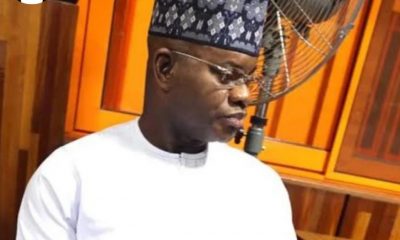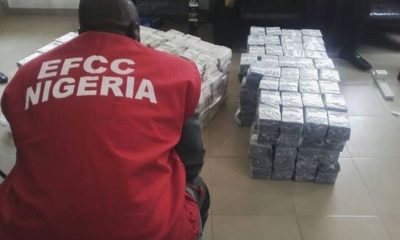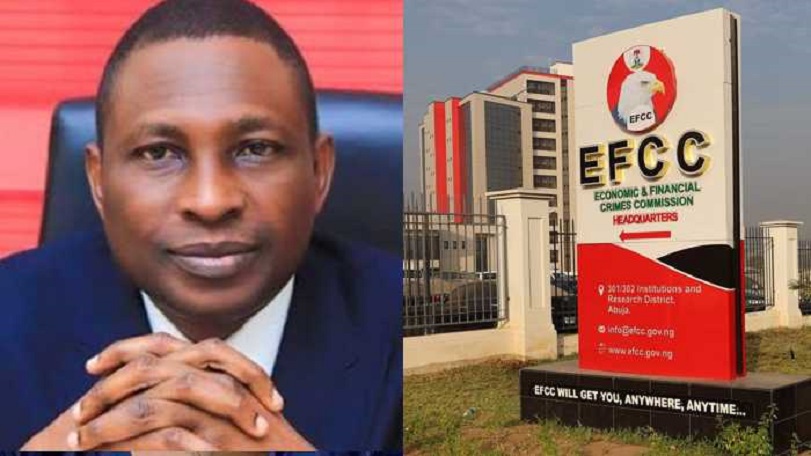General
CSOs Beg Senate To Confirm Magu As EFCC Chairman
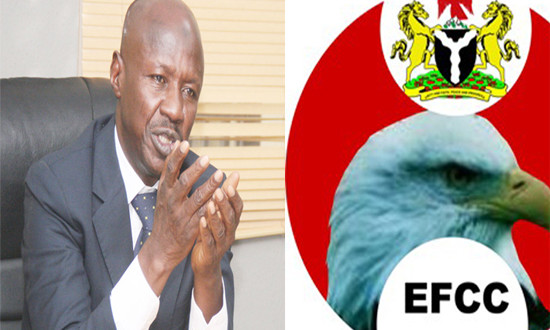
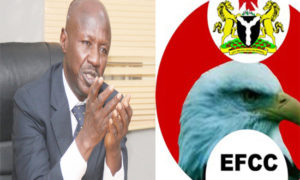
By Dipo Olowookere
A coalition of anti-corruption groups in Nigeria have urged leadership of the Senate to rush the confirmation of the acting Chairman of the Economic and Financial Crime Commission (EFCC), Mr Ibrahim Magu, so as to give the ongoing anti-corruption fight the impetus it desperately needs and help sustain the Buhari administration in curtailing impunity in governance.
This latest call on the National Assembly reiterates an earlier call made by the Africa Network for Environment and Economic Justice (ANEEJ) in August 2016 in the wake of delays in the confirmation of Mr Magu as substantive Chairman of the EFCC.
The group, rising from the recently concluded National Conference on the Role of the Legislature in the Fight Against Corruption, organised by the National Assembly and the Presidency, noted that prior to the process leading to the confirmation of Mr Magu as Chairman of EFCC, the National Assembly went on recess.
Interestingly, the Senate has since reconvened, screened and confirmed justices of Supreme Court and Board of the Niger Delta Development Commission (NDDC) forwarded to it long after the submission of Mr Magu’s name for confirmation as EFCC’s chairman by President Muhammadu Buhari.
The groups, in a press statement issued by their representatives, quoted Section 2 of the EFCC Act, which says ‘there shall be a chairman who shall be the Chief Executive Officer of the commission, and who shall not be below the rank of an Assistant Commissioner of police. He is to be saddled with the responsibility of running the anti-crime commission.’
The anti-corruption groups noted that they believe that Mr Magu, a Deputy Commissioner of Police, meets and exceeds this requirement and that his confirmation as EFCC Chairman should be without further delay.
They noted that if this was done, it would give the anti-corruption fight the boost it needs to end the culture of impunity and systemic corruption in Nigeria.
Members of the platform (ANEEJ, CACOL, CSNAC, Centre for Transparency Advocacy (CTA), and Publish What You Pay) contends that the security of tenure for the leadership of the anti-corruption agencies saddled with the task of tackling the debilitating effects of corruption is a globally recognized principle for guaranteeing the independence of anti-corruption agencies.
Fighting corruption without the basic guarantee of security of tenure for the head of anti-corruption agencies, the coalition said, has become the trend in the recent past in Nigeria, stressing this has been one of the major limitations of the fight against the scourge of corruption in Nigeria, noting that the Senate has a duty to reverse this trend.
The coalition said while the EFCC has of late stepped up the fight against acts of corruption and abuse of public trust as exemplified in the tracking of those remotely and directly connected with the misapplication of monies meant to fight Boko Haram insurgency, confiscation of the properties suspected to have been acquired from proceeds of crime linked to politically exposed persons as well as the investigation and prosecution of alleged owners, the lack of a substantive head with a secured tenure has been a major setback in all these efforts.
“This delay by the Senate sends a wrong signal of deliberate attempt by the Senate to frustrate the anti-corruption fight or at best, exert political pressure on the EFCC and force it into some compromise with the Senate,” they said.
The groups also called on President Buhari to use the ongoing second review mechanism of the United Nations Convention Against Corruption (UNCAC), which Nigeria is undergoing, to send a strong message to the international community that Nigeria is genuinely committed to the fight against corruption.
General
NIMASA Rallies Stakeholders’ to Develop National Action Plan

By Adedapo Adesanya
The Nigerian Maritime Administration and Safety Agency (NIMASA) has pledged its commitment to provide the regulatory leadership, technical coordination, and stakeholder engagement required to successfully develop and implement a robust National Action Plan on maritime decarbonization in Nigeria.
The Director General of the agency, Mr Dayo Mobereola, made this known during the National Stakeholders’ workshop on the development of a National Maritime Decarbonization Action Plan, further describing the workshop as a critical step in actualising the Federal Government’s blue economy and climate objectives.
Represented by the Executive Director, Operations, Mr Fatai Taiye Adeyemi, the NIMASA DG underscored the significance of the IMO GreenVoyage2050 Project, a technical cooperation initiative /designed to support developing countries in implementing the IMO GHG Strategy.
According to him, the National Action Plan being developed will reflect national realities, leverage existing capacities, address identified gaps, and align with broader economic and environmental priorities of the federal government.
Mr Mobereola stressed that “this transition is not merely about compliance with international obligations, it is about safeguarding our marine environment, protecting public health, strengthening the blue economy, and ensuring that our maritime industry remains competitive and future-ready”, the DG said.
Also speaking at the event was the Technical Manager of the IMO GreenVoyage2050 Project, Ms Astrid Dispert, who highlighted that the overarching objective of the initiative is to advance a coherent and globally aligned regulatory framework to accelerate maritime decarbonization.
She also emphasised that NIMASA plays a pivotal role in driving the project at the national level.
The IMO GreenVoyage2050 Project provides technical expertise and institutional support to assist countries in developing and implementing National Action Plans that promote sustainable shipping practices, encourage investment in clean technologies, and strengthen capacity for long-term emissions reduction.
Through this collaboration, the federal government is advancing deliberate steps towards maritime decarbonization, reinforcing its commitment to global climate goals and ensuring a cleaner, greener, and more sustainable future for the sector.
General
BPP Mandates Digital Submission for MDAs From March 1

By Adedapo Adesanya
The Bureau of Public Procurement (BPP) has directed all Ministries, Departments and Agencies (MDAs) to comply with its digital submission process effective March 1.
The directive was contained in a circular signed by the Director-General of the Bureau, Mr Adebowale Adedokun, noting that the move was part of the bureau’s commitment to digital transformation and paperless governance.
It explained that the transition followed an earlier circular of Aug. 4, 2025, which introduced electronic submission procedures.
According to the bureau, it has successfully moved from physical filings to a dedicated e-mail service for document submissions and is now advancing to a more robust and integrated system.
The circular announced the inauguration of the BPP Digital Submission Portal, a web-based platform designed to enable MDAs submit procurement-related documents directly to the Bureau.
It stated that the automated platform would streamline the submission process, enhance transparency and ensure accelerated tracking of procurement-related documents and petitions.
“With effect from March 1, all MDAs will be required to use the portal to submit requests for ‘No Objection’ Certificates, approvals for ‘No Objection’ for special procurements, clarifications and status updates on submissions,” the bureau said.
It added that the portal would be hosted on the Bureau’s official website and would become fully operational from the effective date.
The bureau warned that physical submissions or manual hand-deliveries would no longer be prioritised and would eventually be rejected following the full transition to the digital platform.
It urged accounting officers to brief their procurement departments and ICT units on the development to ensure seamless processing of procurement activities from March 1.
It further advised MDAs to contact the Bureau via its official email for information on the onboarding process and integration into the portal.
The bureau emphasised that full compliance by all MDAs was required to ensure a smooth transition and avoid delays in the implementation of the 2026 fiscal year procurement processes.
General
Senate Seeks Removal of CAC Boss Hussaini Magaji
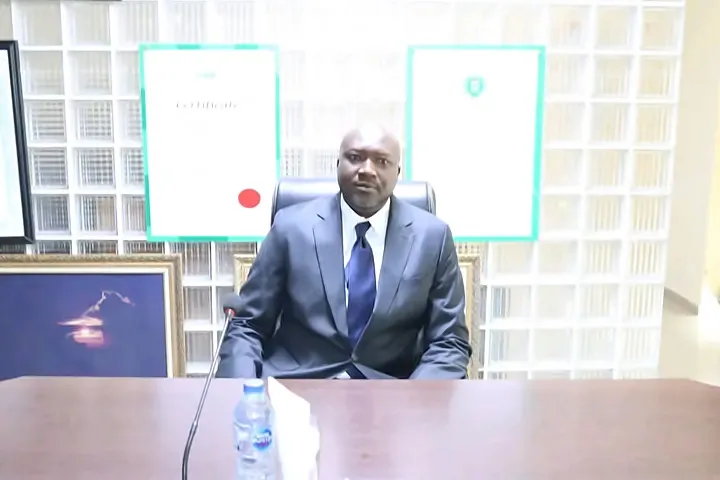
By Adedapo Adesanya
The Senate has asked President Bola Tinubu to remove the Registrar General of the Corporate Affairs Commission (CAC), Mr Hussaini Ishaq Magaji, from office.
The Senate Committee on Finance, while passing a resolution in Abuja on Thursday, accused Mr Magaji, a Senior Advocate of Nigeria (SAN), of failing to honour the Senate’s invitations to account for the finances of his agency.
“He refused on so many occasions to honour our invitation to appear before this committee.
“We have issues with the reconciliation of the revenue of CAC.
“Each time we invite him, he gives us excuses,” the Chairman of the committee, Mr Sani Musa, said as the committee passed the resolution.
CAC was part of a group of agencies that the House of Representatives Public Accounts Committee (PAC) recommended zero allocation for the year 2026, for allegedly failing to account for public funds appropriated to them.
The committee, at an investigative hearing held two weeks ago, accused CAC and some other ministries, departments and agencies (MDAs) of shunning invitations to respond to audit queries contained in the Auditor-General for the Federation’s annual reports for 2020, 2021 and 2022.
The PAC chairman, Mr Bamidele Salam, stated that the National Assembly should not continue to appropriate public funds to institutions that disregard accountability mechanisms, saying this will create fiscal discipline and strengthen transparency across federal institutions and conform with extant financial regulations and the oversight powers of the parliament.
“Public funds are held in trust for the Nigerian people. Any agency that fails to account for previous allocations, refuses to submit audited accounts, or ignores legislative summons cannot, in good conscience, expect fresh budgetary provisions. Accountability is not optional; it is a constitutional obligation,” he said.
-

 Feature/OPED6 years ago
Feature/OPED6 years agoDavos was Different this year
-
Travel/Tourism10 years ago
Lagos Seals Western Lodge Hotel In Ikorodu
-

 Showbiz3 years ago
Showbiz3 years agoEstranged Lover Releases Videos of Empress Njamah Bathing
-

 Banking8 years ago
Banking8 years agoSort Codes of GTBank Branches in Nigeria
-

 Economy3 years ago
Economy3 years agoSubsidy Removal: CNG at N130 Per Litre Cheaper Than Petrol—IPMAN
-

 Banking3 years ago
Banking3 years agoSort Codes of UBA Branches in Nigeria
-

 Banking3 years ago
Banking3 years agoFirst Bank Announces Planned Downtime
-

 Sports3 years ago
Sports3 years agoHighest Paid Nigerian Footballer – How Much Do Nigerian Footballers Earn






